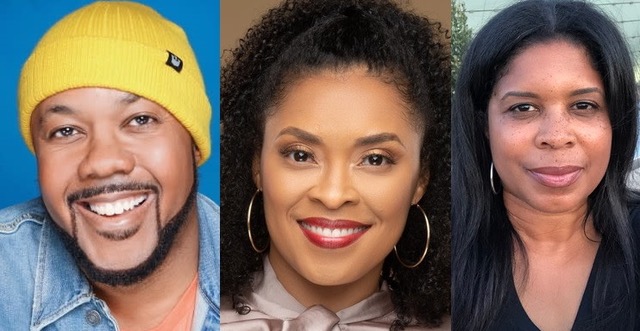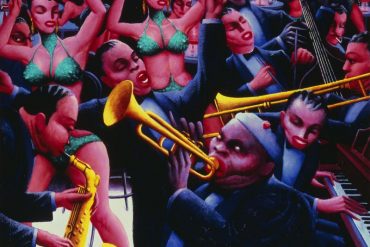Without a doubt, the internet as a whole and, more specifically, social media, has proven to be a great connector of people. In the best cases, art and jobs have been created, families reunited, and lives have been saved, all thanks to social media. But with almost anything, too much of it can have real-time and real-life negative effects on us.
Our Q&A this week is with a group of filmmakers (David Leonard, Natasha Parker, and Adrienne Swan) who have put together a film that takes an unflinching look at how perception vs. reality can blur everyday life. The more time we dedicate to scrolling through our social media, the more it can foster a sense of discontentment, insecurity, and even depression within us.
Set against the backdrop of the pandemic, Scroll Food tells the story of Derrick Loomis, a financial advisor quarantining at home alone when his mental health begins to suffer due to his inability to put down his phone and “disconnect” from the online world while also dealing with his own real-life issues and personal demons.
N’DIGO recently sat down with the trio to discuss the film and its message, as well as their favorite films, respective paths to the world of filmmaking, and so much more.
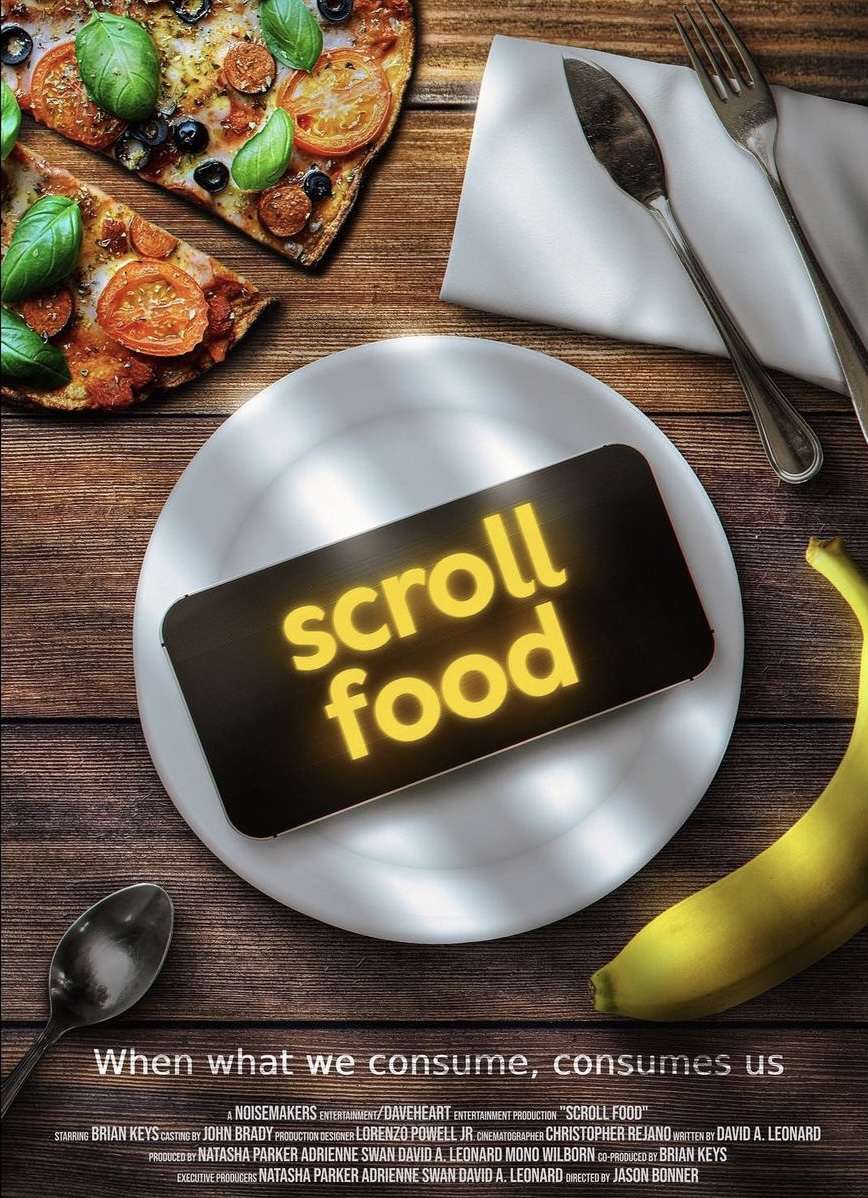
N’DIGO: Please tell us a little about your love of filmmaking.
David: I’ve always loved seeing the evolution of a film project from its inception to development to pre-production, production, post-production, and distribution. All of the intricate parts of a production, especially the diverse crew members coming together to create a work of art, is a magical experience that words can’t describe. Working on someone else’s project is also one thing, but it takes on a different significance when you bring your vision to life, so I decided to write “Scroll Food.”
Natasha: My love for filmmaking began for me as an actress. Over time, I desired to go behind the scenes and write stories that I wanted to see on screen. Once I became a Location Manager and sat in the rooms with Directors and Producers, my passion led me toward the path of Producing. Being able to take words on a page and produce them in minutes on screen is a level of excitement that is unmatched.
Adrienne: I’ve always loved storytelling. Filmmaking is the visual medium for telling stories that enable us to connect to the world. I love that filmmaking is a truly collaborative process where every single person in front of the camera and behind it commits to work together to bring the story from the page to the screen. I find it incredibly rewarding in the filmmaking process, knowing that we are all just a spoke in the story wheel and that working together is the only way to move forward to accomplish our goal.

What is your first favorite movie and your current all-time favorite movie?
David: “Back To The Future” is definitely one of my first favorite movies. I love that entire franchise, and it’s one that I can watch over and over again. “Boomerang” is still a huge favorite of mine. “” is probably a close second favorite of mine.
Natasha: My first favorite movie was “The Last Dragon”. I watched that movie literally every day after school. My current all-time favorite movies are “Bridesmaid” and “Encanto.” I literally can watch those two movies on repeat. I love comedies and animation!
Adrienne: I don’t have an all-time favorite movie,, but my first favorite was “Close Encounters of the Third Kind“. It was the first movie I saw in a theater, and after seeing that story unfold on the big screen, my mind opened to the power of storytelling in a visual way.
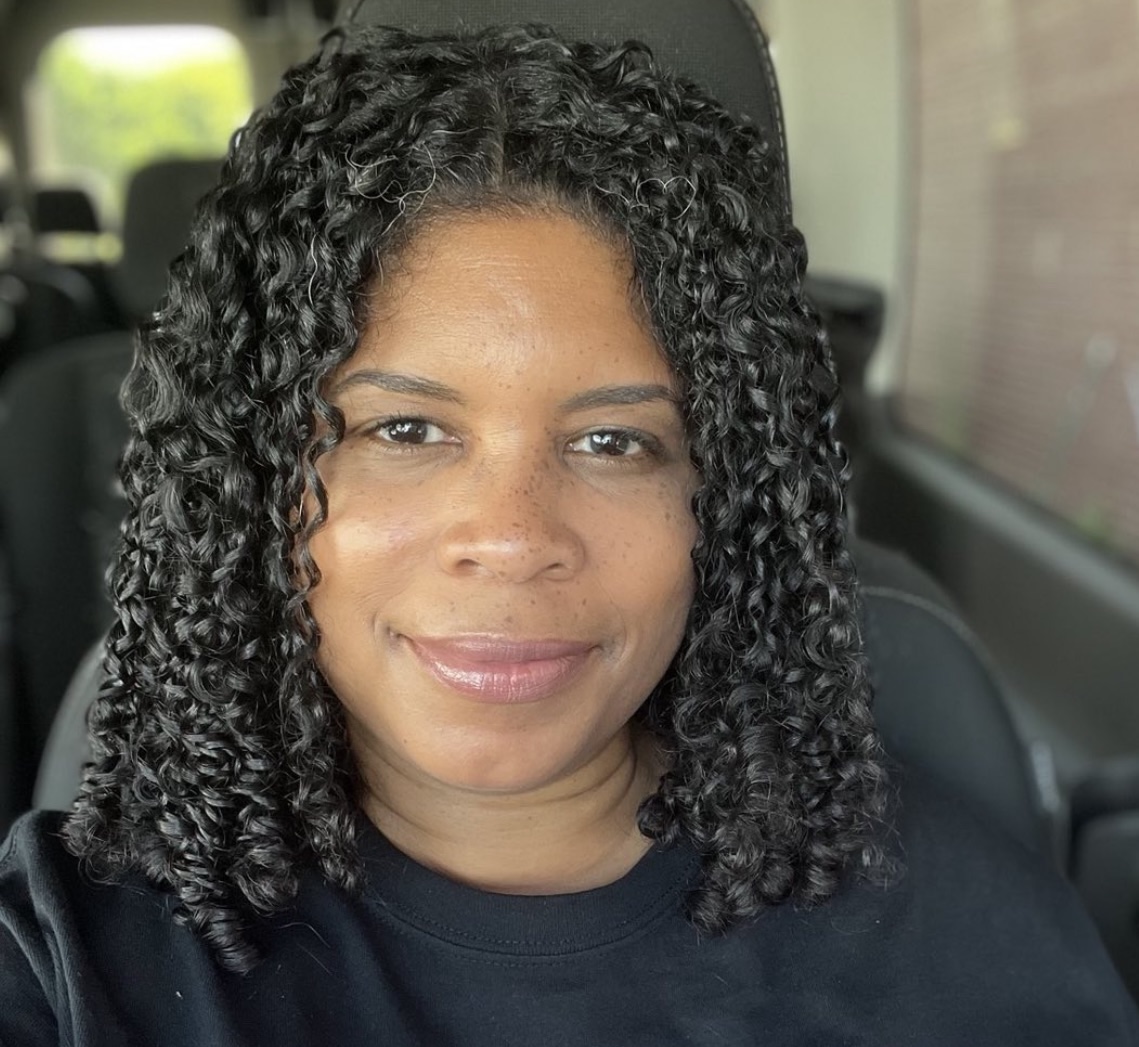
Who are three of your favorite filmmakers?
David: This, again is another tough question to answer because there are so many, but a few that come to mind are Steven Spielberg, Antoine Fuqua, and Mario Van Peebles.
Natasha: First, John Singleton. The span of his career and the films is like watching your own family on screen. You know these characters personally—also, Gina Prince Bythewood. I’ve had the honor of seeing her process behind the scenes, and her level of dedication is unparalleled—lastly, Martin Scorcese. I’ve always been a fan of his work since I was a teenager and was allowed to watch his films—just classics.
Adrienne: I can’t pick any favorites. Every is uniquely fashioned to tell their own stories.
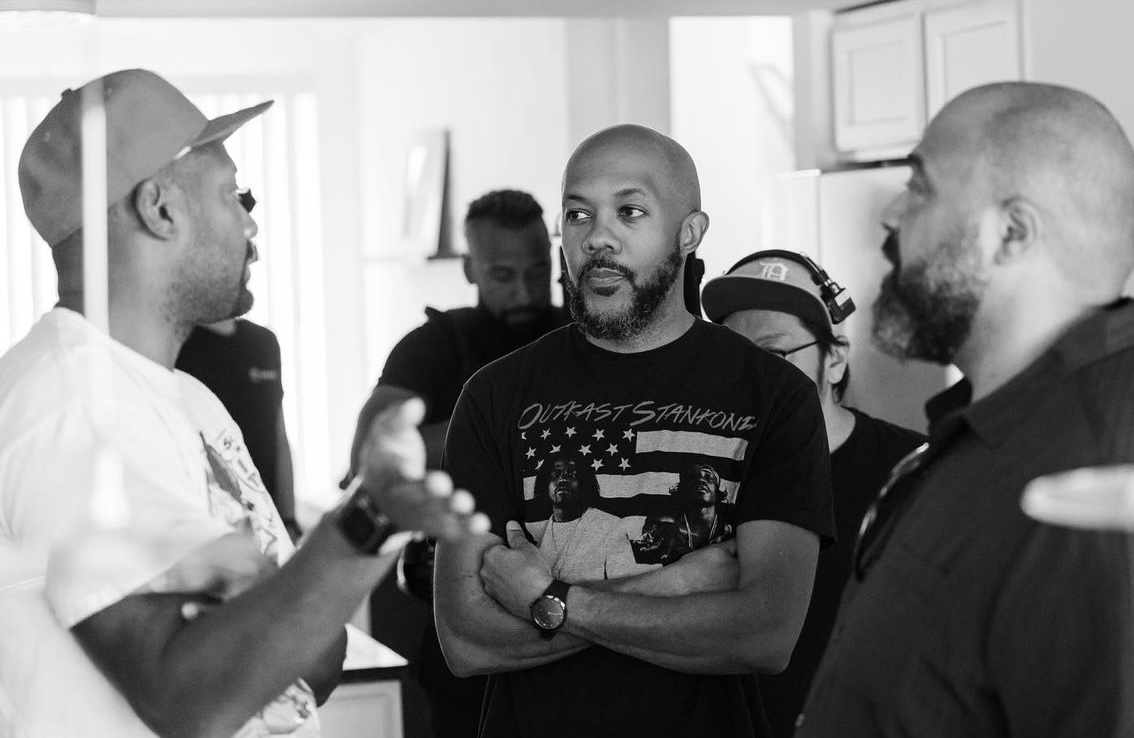
How did you get your start in filmmaking?
David: I got my first opportunity in film back in 1998, working as a security guard on a soundstage for a horror film that was shooting in Chicago called “Stir of Echoes.” The production manager on the project asked me if I’d be interested in working on the set, and I was more than happy to do so. I initially worked as the propane heater tech and transitioned into a set production assistant.
Natasha: I started in 2004 on “Stranger Than Fiction” as an Office PA, where I met Adrienne, the 1st Asst. Accountant. I worked that job as if it was my last. I helped the office, props, and crafty; I was everywhere on that film. I was honored for the chance and wouldn’t waste the opportunity. As that job was ending, Karyn placed a call and got me on the hit Fox series “Prison Break,”and I haven’t stopped since.
Adrienne: In 1996, I worked for a company that had gone through many layoffs. Although I survived the layoffs, I knew then I wanted to work in a creative environment and one that was almost ‘recession-proof.’ Once a week for about a year, I went to the library to read everything I could get my hands on about the entertainment industry. Through a series of networking events, I met the production team from the movie “Love Jones,” worked on the film as an Accounting Clerk, and got my first credit, and I haven’t looked back!
Dave, what inspired you to write the film?
“Scroll Food” was inspired by a difficult period in my life during the 2020 pandemic. My mom, who was a huge influence in my life, had passed away a week before the world shut down due to COVID-19, and I felt like the world was turning upside down. Like most people quarantined at home, my wife and I struggled with isolation and loss of personal connection with our friends and family. We were on our phones and watching television more than ever, just trying to stay connected to what was unfolding in the world. The reality of everything that was taking place (i.e., the loss of life from the virus, the George Floyd unrest, the vitriol and hate that was online due to the Trump presidency) was overwhelming at times, and I began going into a deep depression as a result of what I was seeing. Instead of allowing my emotions to get the best of me, I decided to pivot away from all the “doom and gloom” and write about what I was feeling in story form.
Adrienne and Natasha, what drew you to sign on as EP’s?
Adrienne: I primarily signed on as an EP because I believed in the story and its ability to relate to all audiences. All of us who have lived through the pandemic and civil unrest can relate to the themes of isolation, anger, loss, and uncertainty. No one was exempt from the experience, and with technology in the palm of our hands, we relied on it to maintain our connection to the outside world, and that connection did not always prove to be beneficial.
Natasha: David and I were working on the series “61st Street” together when he gave me this script. I read it and asked, “Why are you in Locations?!?!?” We laughed, and I said, “Let’s make this film!” I can sympathize with the story. We all have had those dark days when there was no light. We needed to see the vulnerabilities, the fear of loss, and the loneliness. Everyone has been through three distinct characteristics at some point in life. It was poignant.
How do you maintain your mental health, and what does your self-care routine look like?
David: I sometimes journal. Other times, I’ll take baths while listening to positive mind-affirmations or meditation music. If the weather is nice, I’ll walk to the beach, sit by the lake, and reflect. Although it’s hard these days, I try to “unplug” and put my phone away or leave it in another room so I’m not tempted to check social media or news stories regularly.
Natasha: My self-care is gospel music on repeat. It eases the stresses of my mind, refocuses me, and provides the time and moments to reflect on what’s really important. It’s my peace.
Adrienne: I maintain my mental health by always affirming my unwavering faith in God and trusting that He is in control. My routine consists of a prayer-filled life, meditation, and attending worship services regularly. In the physical sense, I am an avid forest bather, and being in nature daily energizes me.
What is your favorite and least favorite part of indie filmmaking?
David: My favorite and least favorite parts of filmmaking pretty much go hand in hand. I consider myself prudent and sometimes overly cautious because I like everything to go according to plan, but that isn’t how life works, and IT ESPECIALLY IS NOT HOW FILMMAKING WORKS! In contrast, I think that is what I also admire about filmmaking. It’s a coordinated effort of organized chaos. A lot of the pieces come together at the last minute, and there can be a lot of stressful moments along the way, but when that puzzle is complete, it is a beautiful thing, and as creators, that instills confidence in us that we can take an idea and mold it into something that an audience can enjoy and use to escape from their own realities for a moment.
Natasha: My favorite part is utilizing my skill sets to bring a project I deeply believe into the screen with a collective group of filmmakers striving for the same. My least favorite part is finding the money to make it happen.
Adrienne: My favorite and least parts of indie filmmaking are two sides of the same coin: Indie filmmaking is a grassroots, bare-bones endeavor, and it requires a lot of creativity to tell impactful visual stories with oftentimes limited resources.
Best advice to aspiring filmmakers?
David: Remember to have fun when creating and focus on the unique stories you want to tell. Don’t feel compelled to subscribe to the latest “trends” in the business or what you think will sell in Hollywood. Be the shift in the industry.
Natasha: Bet on yourself and your talent. Don’t wait for someone to notice your talent and give you a chance. Make it happen as best you can, and find folks who believe in your vision as much as you do.
Adrienne: The best advice I can give to filmmakers [I don’t say ‘aspiring’ filmmakers because everyone with a smartphone can record a subject or content of any length to tell a story] is to use YOUR voice to communicate YOUR story visually. Use the people, places, and things around you as your resources to tell that story. Remember, YOU are an artist, and your creativity is as unique to you as your fingerprint. Always be confident in YOUR vision for the story you’re trying to tell. Your boldness will draw others’ interest in your story!
What if anything, do you want people to take away from the movie?
David: One important message I would like people to take away from “Scroll Food” is to try to focus on the positive in life and not get too caught up with comparing our online worlds with our offline worlds. Social media is a tool with many benefits, but it can also distort reality and our perception of it. If we feed our minds with all of the negative images we see while mindlessly scrolling, the results can be devastating to our mental health. This generation now doesn’t know what life without screens was like, so their perspective is very different from mine. However, taking time to “unplug” and connect in real life socially can make a huge difference and improve genuine human connection.
Natasha: Remember, “This too shall pass.” That horrible feeling, those tense moments, storms will pass just don’t give up before the sun comes out.
Adrienne: I would like audiences to recognize the impact of technological distractions in their [our] own lives and how it affects not just us but how we relate to events and communicate with others. Our ability to focus and be present shifted long before the pandemic, but “Scroll Food” helps us all realize that anything out of balance is chaos and causes disease.
For more information, please visit the website for Scroll Food, and feel free to connect with the film and stay up to date via Facebook and Instagram.


